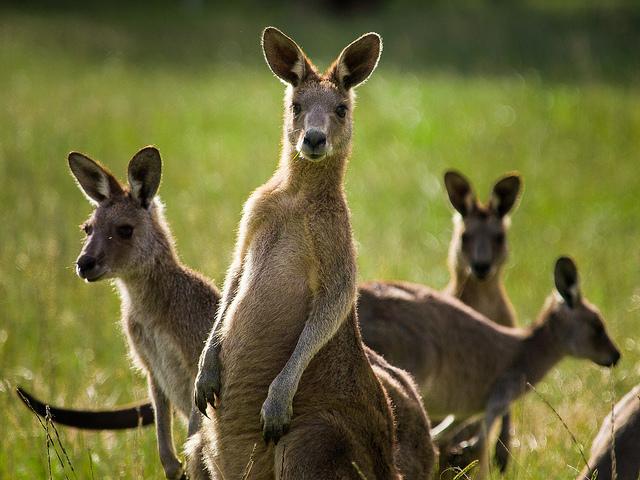Australia, ANZUS and regional order
Posted By Rod Lyon on December 6, 2016 @ 14:30

Since Donald Trump’s victory in the US presidential election last month, the volume of discussion about Australia’s relationship with the US and our region has increased sharply. Politicians, officials, think-tankers and journalists have all weighed in. Much of the debate has turned upon the future status of the ANZUS treaty, with the Prime Minister keen to paint Senator Penny Wong’s thoughtful op-ed piece [1] as a breakdown of the previously bipartisan commitment to the alliance. Meanwhile, Paul Keating has argued that Australia should put an end to its ‘tag-along foreign policy [2]’—although the alliance’s defenders say that no such subordination [3] is involved.
I’d like to move the discussion to a more abstract level, by canvassing what Australia wants in terms of grand strategic outcomes. Too often that question goes unasked. At least since the days of Coral Bell’s book, Dependent Ally [4], commentators have leapt to the conclusion that Australia deliberately wallows in a comfortable dependency. In the final analysis, though, we’re not a member of ANZUS because of a blind attachment to great powers. We’re in the alliance for strategic reasons. ANZUS ties us not simply to the region’s predominant military power but to its predominant order-builder.
And that matters because what Australia wants is a stable, liberal, prosperous order in Asia. It’s drawn to Washington because the US has been the principal architect of such an order. Indeed, among the existing great powers, the US has played a unique order-building role. Russia’s too Eurocentric to shape the Asian security environment; Japan’s been—since World War 2—too withdrawn to articulate an independent strategic agenda; China seems to want a return to the Sinocentric Asia (and deferential neighbours) of yesteryear; and India’s been too under-developed and too geographically remote from the Asia–Pacific’s centre of gravity to do much order-building.
So, ANZUS is our link to the order-builder. But it’s only our link. The regional order doesn’t run solely through ANZUS. Indeed, we’re merely the distant southern anchor of US alliance commitments in a region where the large, lumpy bits of power—and the key strategic relationships—are still found in the northern hemisphere. Moreover, our alliance is exceptionally close. It’s built on ties of blood and culture, and not just shared interest. As far as we know, Trump likes Australia. So it’s entirely possible that the ANZUS alliance will survive, but that the broader regional order—what Ron Huisken calls the ‘confidence that tomorrow is going to be very much like today [5]’—won’t.
And that would be bad news for Australia. In some ways the order’s more important to us than the alliance. Just as a thought experiment, think about which one’s more expendable. An Asia that’s stable, liberal and prosperous, but in which ANZUS doesn’t exist, is probably preferable to one that’s unstable, authoritarian, and poor, but in which ANZUS does exist. I’m not saying we should be indifferent to ANZUS’s future. Obviously we’d prefer to keep the alliance around, both as a mechanism for order-building in good times and a security guarantor in bad. Still, if the thought experiment’s right, we need to think about looming geopolitical discontinuities in the broad rather than the narrow. The central question shouldn’t be whether Donald Trump likes Skippy.
Let’s turn, then, to those broader discontinuities. Japan’s security policy has long been a subset of Washington’s, which means that Japanese policymakers have typically been more sensitive than their Australian counterparts to the potential marginalisation of their strategic interests in Washington. It’s no surprise that Prime Minister Abe was the first foreign leader to meet with Trump—Abe’s actions speak louder than his words in signalling Tokyo’s high-level strategic concern about Trump’s nationalism and unilateralism.
South Korea’s harder to read, because its president has been fighting for her political life. But North Korea’s pushing ahead with its nuclear arsenal and President Obama’s policy of ‘strategic patience’ is all but dead in the water. So Trump’s campaign ruminations about the possibility of both South Korea and Japan building their own nuclear weapons can only have magnified Seoul’s concerns that Washington’s increasingly sensitive to the potentially costly contests associated with extended nuclear deterrence in Northeast Asia. Putting the judgment in its starkest form, I think the prospects for nuclear proliferation in Northeast Asia are higher now than they’ve ever been.
Worries about the future are most intense in Northeast Asia, but are felt elsewhere as well. Since the days of the Vietnam War, Southeast Asia has become accustomed to being a second-order priority in Washington. The Obama administration, articulating a policy of rebalancing not only to Asia but within it, had begun to shift that perception. But the subregion must now wonder again about its relative priority on Washington’s agenda. What’s worse, that uncertainty’s increasing at a time when China’s maintaining its assertive posture in the South China Sea.
By all means, Canberra should be talking to the incoming administration about the ANZUS relationship. But we shouldn’t be fooled into thinking that’s our sole, or even our primary, concern. Our grand strategic objective is a stable, liberal, prosperous order in Asia. What we need to think about is how to achieve that objective in a more uncertain future, especially if the lynch-pin of the current order fails in Northeast Asia.
Article printed from The Strategist: https://aspistrategist.ru
URL to article: /australia-anzus-regional-order/
URLs in this post:
[1] thoughtful op-ed piece: http://www.smh.com.au/comment/trumps-election-is-a-turning-point-for-australian-foreign-policy-20161114-gsp5kd.html
[2] tag-along foreign policy: http://www.abc.net.au/news/2016-11-10/keating-on-american-foreign-policy-after-trump-victory/8015028
[3] no such subordination: http://www.theaustralian.com.au/opinion/columnists/gerard-henderson/keating-wong-comments-on-us-alliance-are-stirring-the-possum/news-story/f4f7bdfd35e037848608c1b684f77b54
[4] Dependent Ally: https://books.google.com.au/books/about/Dependent_ally.html?id=Q3qGAAAAIAAJ
[5] confidence that tomorrow is going to be very much like today: /donald-trump-coming-scrutiny-anzus/
Click here to print.